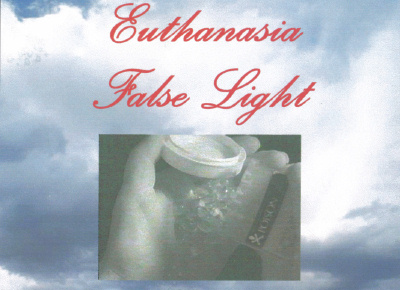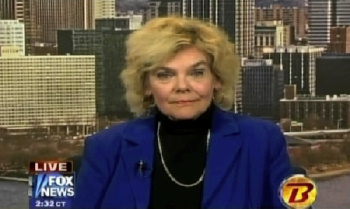Mary Martin Continues to Speak Out
Although Mary Martin lost her quest to remove her husband’s food and fluids [In re Martin, 538 N.W. 2d 399 (Mich. 1995)], she continues to advocate the removal of food and fluids from individuals who are severely disabled.
Addressing the “Families on the Frontier of Dying” conference in Philadelphia on May 21 1998, Mrs. Martin said, “He [Michael] is not PVS. He is conscious, awake….”
Referring to the fact that her husband was injured in a car-train accident, she asked, “Do you know why car insurance rates are so high?”
“Because people like Mike are being forced to stay alive. In his condition now he could probably out live me and our children. He’s in well enough health, thanks to the feeding tube, he could out live us all. And for what? Because his mother and sister aren’t willing to let him go.”
She further stated, “He does nothing but smile…. Patients like this can smile and nod their head….They could be the organ donors who are so desperately needed.”
[Source: Transcript of conference video tape, “How Do Families Cope?” Families on the Frontiers of Dying, Philadelphia, PA, May 21, 1998.]
Background information from IAETF Updates:
From IAETF Update (May-June 1993)
Food and fluids questioned for disabled Michigan man who wants to live
The case of Michael Martin, a 41-year-old Michigan man who suffered head injuries as a result of a 1987 car-train accident, is currently before the Michigan Court of Appeals. Oral arguments are scheduled for 5/6/93.
Michael is conscious, alert, appears happy, plays card games, and loves country-western music. He has communicated through a computer-augmented device that he wants to live.
Mary Martin, his wife and legal guardian who has been in contact with the Hemlock Society, wants to have his food and fluids (provided by gastrostomy tube) withdrawn. She says that, years before the accident, Michael had made statements indicating that he would never want to be maintained as a vegetable. Michael’s mother and sister are fighting for his right to live and want Mary removed as his guardian, but have been unable to establish legal standing. According to his sister, Pat Major, “Brain-injured is not brain dead…. This is euthanasia — get rid of anyone who needs care.” [The Detroit News, 10/25/92: 1B]
Mary Martin is currently appealing a 11/12/92 ruling by probate Judge George Grieg which rejected her request (to have Michael starved and dehydrated to death) on the basis that Michael’s statements prior to the accident were not written. But the judge indicated that he would have granted the wife’s request if Michael were terminally ill or unconscious.
The fact that Michael currently expresses the wish to live was ruled irrelevant by the judge because of Michael’s “impaired condition.”
Yet Michael has been assessed as a level five on the Los Amigos Ranchos scale, a scale used by rehabilitation doctors to assess a patient’s improvement. A level five means that the patient is interactive and ready for intensive rehabilitation. Court testimony also indicated that Michael has an I.Q. (after the accident) ranging from between 61-73 — the range fore someone mildly retarded.
Judge Grieg’s ruling raises serious questions regarding the autonomy of disabled patients and just how “impaired” a person has to be before he or she no longer has rights and interests.
From IAETF Update (September-October 1993)
Update: the Michael Martin food and fluids case
As previously reported in the Update (5-6/93), the case of 41-year-old Michael Martin, severely disabled as the result of a 1987 car-train accident, is currently before the Michigan Court of Appeals. Michael, who experts say is not in a persistent vegetative state, has indicated that he wants to live. His wife and current legal guardian, Mary Martin, petitioned a Michigan Probate Court to have Michael’s gastrostomy tube feeding stopped, claiming that Michael had made statements prior to the accident indicating that he would not want to live as a “vegetable.”
But 2 of Michael’s co-workers, who were present at the time Michael made those statements, testified that his present condition is not the type Michael referred to in those statements. Probate Judge George Greig rejected Mary Martin’s request to have Michael starved and dehydrated to death because Michael’s pre-accident statements were not in writing.
The judge would have granted the request if Michael were terminally ill or unconscious. The fact that Michael indicated that he wanted to live was ruled irrelevant by the judge because of Michael’s “impaired condition.” The judge also refused to give legal standing to Michael’s mother and sister, who were attempting to remove his wife as legal guardian.
On 7/19/93, the Michigan Court of Appeals remanded the case back to the Probate Court for further proceedings. According to the Court of Appeals, the Probate Court did not “make findings of fact and conclusions of law with sufficient specificity so as to allow this Court to review” the case. The Appeals Court found that the Probate Court:
failed to issue specific findings based on the evidence as to Michael’s current decision-making capacity and his “present level of physician, sensory, emotional, and cognitive functioning.”;
erred when it denied the petition of Michael’s mother and sister to have Mary Martin removed as legal guardian without even holding a hearing concerning the “possible bias, prejudice, conflict of interest, or improper motive” on the part of Mary Martin; and
erred in not granting his mother and sister legal standing.
Probate Judge Grieg has 56 days from the date of the remand order to initiate proceedings to resolve these and other questions. Grieg’s new “findings of fact and conclusions of law” must be forwarded to the Court of Appeals within 28 days of the close of those proceedings.
From IAETF Update (July-August 1994)
Better dead than disabled
When last reported in the Update (9-10/93), the case of 41-year-old Michael Martin was before the Michigan Court of Appeals. Michael is severely disabled as a result of a 1987 car-train accident, he is not in a persistent vegetative state; and he has communicated through a computerized device that he wants to continue living. Yet, despite his currently expressed wishes, Mary Martin, his wife and legal guardian, has petitioned the courts to have his food and fluids withheld. Michael’s sister and mother have been fighting for his right to live.
On 7/19/93, the MI Court of Appeals remanded the case back to the Probate Court for specifics regarding findings of fact and conclusions of law. The Probate Court had previously ruled against the removal of food and fluids, but also offered the opinion that Michael’s expressed wish to live was irrelevant because of his “impaired condition.”
Following the Court of Appeals’ remand order, probate Court Judge George A. Grieg changed his original ruling and agreed to allow Mary to order the removal of her husband’s feeding tube. That ruling was then affirmed by the Court of Appeals. The MI Supreme Court is considering whether to grant an appeal.
Michael, who is alert, plays card games, watches TV, loves country-western music, and appears content in his current nursing home, recently spelled out “Afraid” on his alphabet board. When the speech therapist asked him, “Are you afraid of somebody?” Michael shook his head no. “Are you afraid for somebody?” asked the therapist. Michael nodded yes. The therapist queried whether Michael was afraid for the nurses, aides, or his roommate. Michael indicated no. Was he afraid that someone would remove him from the nursing home? Yes.
According to chart notes, when Michael was assured that he would be at that facility for “quite awhile,” he produced a big smile. That nursing facility has refused to starve and dehydrate Michael to death. If his wife gets her way, Michael would have to be removed from his current home.
Write/lawyer Wesley J. Smith, who has been closely following this case and has written about it for the National Review, posed the question, “Why isn’t the benefit of doubt being given to the choice of life in these starvation cases?” “Perhaps,” writes Smith, “it is because we are becoming a society that increasingly believes that it is better to be dead than disabled.” [Wesley J. Smith, “Better Dead Than Fed?” National Review, 6/27/94]
From IAETF Update (September-October 1995)
MI Supreme Court rescues Michael Martin
The Michigan Supreme Court ruled on 8/22/95 that Mary Martin, wife and legal guardian of severely disabled Michael Martin, could not be permitted to cause Michael’s death by having “life-sustaining treatment,” namely his food and fluids, withheld. In a 6-1 decision, the Court found that the testimony and affidavit of Mary Martin, claiming that Michael had said several times prior to his injury that he would never want to live “like a vegetable,” does not constitute clear and convincing evidence that he would not want to continue living in his present condition.
According to lower court testimony, Michael — who had suffered a closed head injury in a 1987 car/train accident — is not in a persistent vegetative state nor terminally ill, can carry out some voluntary motor commands, can recognize faces, and can communicate with other people through head nods. There was also testimony from various health care providers that Michael seems happy with his environment and that he has responded with a “no” head shake when asked if there were ever times when he did not want to go on living.
Yet, in spite of these facts, both a MI probate court and the MI Court of Appeals ruled that nutrition and hydration could be withheld from Michael. One judge held that Michael’s response indicating that he wanted to go on living was irrelevant given his impaired condition. Michael’s mother, Leeta Martin, and his sister, Patricia Major, in an attempt to save Michael’s life, appealed the case to the state Supreme Court. (For more background information, see Update, July-August 1994)
Regarding Mary’s contention that Michael’s pre-accident statements prove that he would not want to continue living in his present state, the MI Supreme Court cited conflicting testimony from two of Michael’s co-workers indicating that, before the accident, Michael expressed the wish not to be kept alive if he was ever in a coma or in a vegetative state. “[O]ur review of the record,” the justices wrote, “reveals that virtually all the witnesses agreed that Mr. Martin is not in a vegetative state and is not suffering from the type of incapacitation referenced in his expression of a desire not to continue life-sustaining treatment.” [Mary Martin v. Leeta M. Martin and Patricia major, No. 99699, 99700, MI S. Ct., Slip Op., p. 24]
The Court concluded, “Accordingly, we reverse the Court of Appeals determination because [Mary Martin’s] testimony and affidavit do not constitute clear and convincing evidence of Mr. Martin’s preinjury decision to decline life-sustaining medical treatment in the form of a gastrostomy tube that provides hydration and nutritive support.” [p. 29]
Note: There is virtually an identical case currently unfolding in Stockton, CA. The wife of Robert Wendland has taken steps to have her husband’s food and fluids withheld. She has done so with the unanimous approval of the hospital ethics committee and Robert’s doctor. Robert, 42, became severely disabled after a car accident, but is conscious, interactive, and improving. Robert’s mother and sister have obtained a restraining order to prevent his death. A court hearing is scheduled for 1/13/95. There will be more on this case in the next Update.




